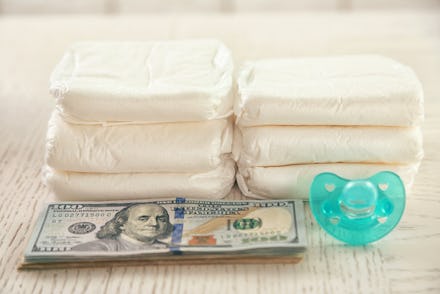Raising kids isn't cheap — and the annual cost of a child is only going up

Wondering if you can afford to have a kid? Here's some sobering news.
Children born in 2015 will cost about $380 more per year to raise than kids born in 2014, according to the Department of Agriculture's latest report on the cost of raising a child in the United States, released Monday.
Overall, families spend between $12,350 and $13,900 annually on their kids, at least when you're talking married couples with two kids in the middle third of income bands, the report found.
That puts the total cost of getting the little tyke from to age 17 at nearly $234,000 — again depending on the total number of kids you have and your family's household income.
As many helpful commentators on Twitter pointed out, that figure does not even include the cost of attending college.
Now, the annual cost will vary much more widely if you are in the lower or upper thirds of income in the U.S. Then you might be spending anywhere from about $9,330 to $23,380 yearly, the report found.
Multiplied by 17 years, that nets out to overall spending of a little less than $160,000 on the lower end and nearly $400,000 on the higher end.
Gulp.
According to the report, the 3% 2014 to 2015 increase in kid-expenses is higher than inflation during that same period — but there's not all bad news.
The growth in costs is still less than the historic annual spike in child-raising costs of 4.3% per year since 1960.
Why is raising children so expensive? Here's how the math breaks down
So, there are actually some upsides to more expensive child-rearing.
Say what?
To arrive at the $233,610 figure, the Department of Agricultures looks at not only how much parents spend, but what they're actually spending on: everything from housing and food to childcare costs and presents.
And over the last 55 years, some of these costs — like food and clothing — have fallen considerably. Other costs have gone up.
That some costs go up while others go down means that, economically at least, the effects of higher child-rearing costs are a little bit of a mixed bag.
That's because some of figures that have grown fastest — think higher childcare costs, which have risen from 2% of overall expenditures to a robust 16% — can definitely create a burden, particularly for single parents.
But on the other hand, the newer costs are also probably better, big picture-wise, for the actual kids in question.
Why?
Spending more on the care for and intellectual enrichment of your children means you are meeting more of your children's deeper requirements, beyond simple sustenance. (See: Maslow's hierarchy of needs.)
These types of investments can really add up, and create huge benefits for society at large.
One White House study found that early childhood education increases average earnings by as much as 3.5% per student.
If this feels like cold comfort, remember it could be worse: Child-raising costs can bounce around a bit year to year and are actually still a little bit lower than they've been at other periods in recent memory. Back in 2011, it cost $235,000 to get the kid from diapers to driving.
Sign up for The Payoff — your weekly crash course on how to live your best financial life.